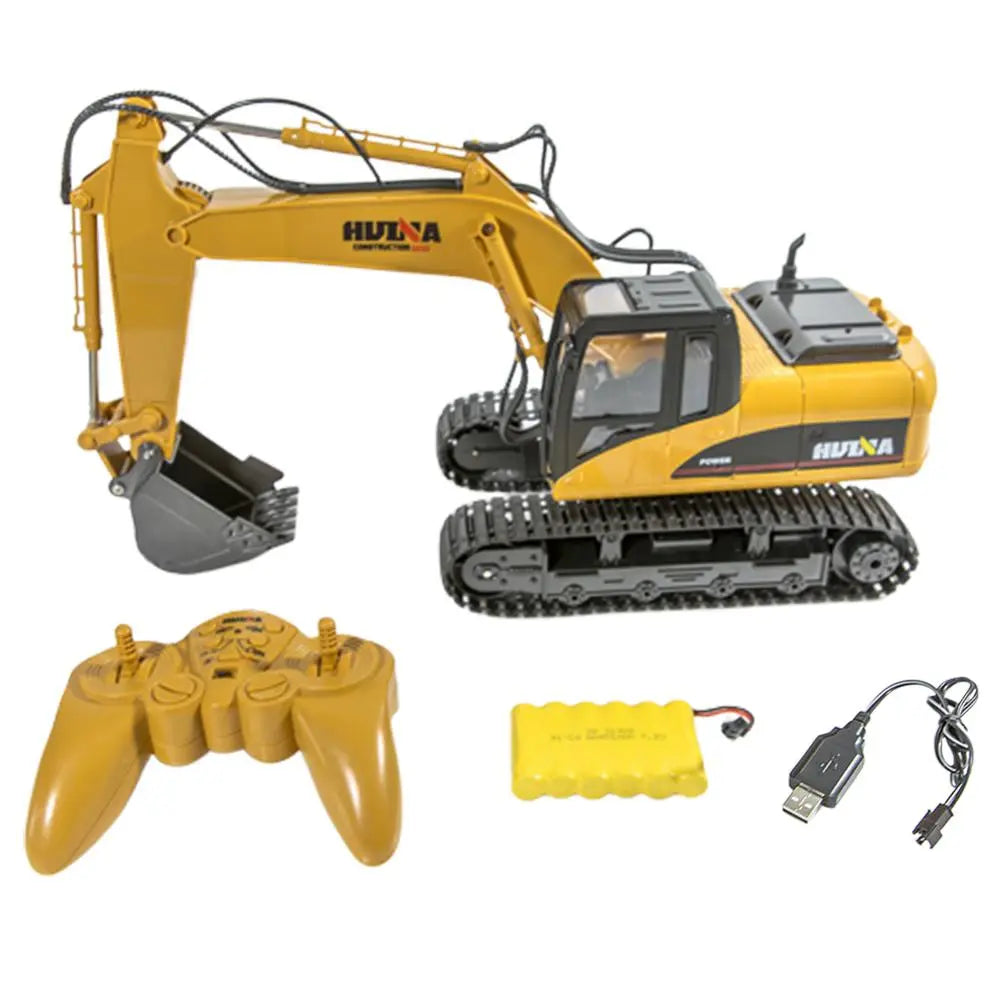Step-by-Step Guide to Operating a rc excavator Like a Pro
Wiki Article
Understanding How Excavator Works and Its Influence On Effectiveness
Excavators play an important function in building and mining procedures, depending on a complex interplay of mechanical and hydraulic systems. Their capacity to do a selection of tasks pivots on both their layout and the technology incorporated within. Understanding these parts can greatly impact operational efficiency and performance. As advancements remain to reshape the industry, one should consider exactly how these changes will certainly affect future methods and performance.The Essentials of Excavator Mechanics

The Function of Hydraulic Equipments in Excavators
At the heart of excavator operation lies the hydraulic system, which plays a crucial function in powering the device's activities and features. This system utilizes pressurized hydraulic liquid to move power, allowing different actions such as digging, lifting, and swinging. By harnessing the principles of hydraulics, excavators can perform jobs with amazing accuracy and force, boosting general operational efficiency.The hydraulic system consists of vital parts, consisting of cyndrical tubes, shutoffs, and pumps, which collaborate to regulate the flow and direction of the fluid. When the driver engages the controls, the hydraulic liquid is directed to certain cylinders, converting the driver's commands into physical motion. This system permits smooth and responsive activities, which are important in construction and excavation settings. double e volvo rc excavator. The performance of the hydraulic system directly impacts the productivity and versatility of the excavator, making it an important aspect in modern excavation proceduresSecret Elements of an Excavator
Recognizing the key elements of an excavator is crucial for understanding exactly how this effective device runs. An excavator includes a number of significant components, consisting of the undercarriage, home, boom, arm, and bucket. The undercarriage supplies stability and flexibility, usually featuring wheels or tracks to navigate various surfaces. The home contains the engine and hydraulic systems, permitting the operator to regulate motion and power the equipment. The boom prolongs from the house, enabling upright reach, while the arm attaches to the bucket, promoting excavating and training operations.Additionally, the cab houses the driver, geared up with controls for exact handling. Each of these components plays an essential role in the excavator's total functionality, contributing to its efficiency and efficiency on building websites. Comprehending these components aids in enhancing and keeping excavator efficiency, making certain jobs are completed safely and efficiently.Add-on Convenience and Its Benefits
Add-on adaptability is a crucial facet of excavators, making it possible for drivers to change in between various tools tailored for details tasks. This flexibility not only enhances task effectiveness but additionally adds to cost-effectiveness by lowering the requirement for several devices. Understanding the various sorts of accessories offered can significantly influence the general performance and performance of an excavator on task websites.Kinds of Accessories
While excavators are primarily recognized for their digging capacities, their real versatility hinges on the large variety of accessories available. These accessories enhance the excavator's capability, enabling it to do various jobs past excavation. Usual add-ons include pails (for excavating and scooping), hydraulic thumbs (for grasping products), and augers (for piercing openings) Grapples are made use of for taking care of and relocating debris, while rippers can break up tough surface areas. Various other specialized accessories, such as plates and plows, enable excavators to adjust to specific work needs. This variety not only increases the machine's energy throughout different sectors, consisting of building and construction, landscaping, and demolition, yet additionally enables drivers to tailor their tools to fulfill specific task demands efficiently.Boosted Job Performance
Making best use of task efficiency is a primary advantage of using various excavator add-ons. Different attachments permit an excavator to do several jobs without requiring to switch equipment, saving useful time and labor. Making use of a hydraulic hammer can break concrete while a bucket attachment can excavate soil, allowing a smooth operations. This flexibility minimizes downtime connected with devices adjustments and boosts productivity on-site. Additionally, specialized accessories enhance accuracy in jobs such as grading or landscape design, bring about higher quality outcomes. The capacity to adjust to numerous job needs not just enhances procedures yet likewise lessens the need for additional machinery, ensuring that tasks are finished promptly and effectively. In general, accessory adaptability substantially adds to raised job efficiency in excavation work.Cost-Effectiveness and Adaptability
Cost-effectiveness is a substantial benefit of making use of functional excavator accessories. These add-ons permit a solitary excavator to do several tasks, decreasing the need for additional machinery and labor - double e volvo rc excavator. By switching between pails, hammers, and grapples, drivers can deal with different jobs, from digging to demolition, thus making the most of equipment usage. This adaptability not just decreases operational costs but additionally decreases downtime related to transforming devices. Additionally, the capability to tailor excavators with specialized add-ons enhances productivity, as they can successfully handle diverse jobs according to project demands. In conclusion, the mix of cost-effectiveness and convenience in excavator add-ons adds to enhanced functional effectiveness and resource appropriation in construction and excavation jobs
Advanced Modern Technology in Modern Excavators
Modern excavators are significantly furnished with advanced innovation that changes excavation processes. Automation simplifies procedures, while enhanced gas effectiveness reduces functional costs. In addition, wise control systems improve accuracy and safety and security, marking a significant advancement in excavation equipment.Automation in Excavation Processes
As excavation technology evolves, automation has actually emerged as a critical element in improving efficiency and accuracy on work websites. Modern excavators are equipped with innovative automated systems that promote jobs such as grading, digging, and trenching with marginal operator treatment. These systems use sensors, GPS, and artificial intelligence formulas to ensure accurate positioning and deepness control, greatly decreasing the margin for error. Additionally, automation allows operators to concentrate on tactical decision-making instead than manual controls, causing improved efficiency on the whole. Such developments not just streamline process yet also improve safety and security by reducing human mistake in complicated operations. The combination of automation in excavation procedures stands for a substantial improvement in construction modern technology, driving the industry towards better effectiveness and performance.Boosted Gas Efficiency
Innovations in innovation have also led to significant renovations in gas performance for modern excavators. Modern machines are geared up with advanced engines that enhance power outcome while reducing gas intake. These engines check out here make use of cutting-edge combustion technologies, such as turbocharging and direct fuel injection, to improve efficiency and efficiency. Additionally, light-weight products in building and construction reduce overall weight, enabling less energy expense during operation. The intro of variable speed controls allows operators to change engine performance according to particular jobs, additionally minimizing gas usage. As a result, these enhancements not only reduced functional prices yet likewise add to environmental sustainability by reducing exhausts. On the whole, improved fuel performance in excavators is a necessary development that reinforces productivity and economic stability in the building and construction market.Smart Control Equipment
While drivers browse significantly intricate work websites, clever control systems in excavators have become necessary tools for improving efficiency and accuracy. These innovative innovations use sensors and algorithms to check numerous parameters such as lots weight, terrain conditions, why not try here and functional performance. By automatically readjusting hydraulic functions, wise systems maximize device performance, resulting in boosted productivity and minimized endure parts. Furthermore, drivers profit from intuitive interfaces that give real-time feedback and diagnostics, allowing for informed decision-making. This combination of innovation not only simplifies procedures however additionally minimizes human mistake, adding to more secure workplace. As the building industry remains to progress, clever control systems will certainly play an important function fit the future of excavator performance and effectiveness.Enhancing Operational Effectiveness With Excavators
Excavators play an essential role in improving operational effectiveness across different building and excavation tasks. Their convenience enables several jobs, consisting of product, lifting, and excavating handling, which enhances operations and reduces the requirement for additional devices. With powerful hydraulic systems, excavators can do durable tasks with precision, considerably decreasing the more information moment called for to full jobs. The combination of advanced modern technology, such as general practitioner and automated controls, additionally enhances their procedure, allowing operators to attain better precision and minimize material waste. Furthermore, modern excavators are designed to consume less fuel and minimize emissions, adding to both price financial savings and environmental sustainability. By using excavators efficiently, building groups can improve efficiency, meet job deadlines, and improve total site management. This multifunctionality and efficiency make excavators essential devices in the contemporary building landscape.The Future of Excavators in Construction and Mining Industries
As the construction and mining sectors advance, the future of excavators is positioned for significant change driven by technological technology and changing functional needs. Developments in automation and fabricated knowledge are improving excavator abilities, permitting enhanced accuracy and effectiveness in operations. Self-governing excavators are arising, lowering the need for human intervention and lessening the threat of accidents.Moreover, the combination of telematics and IoT modern technology makes it possible for real-time surveillance of machine performance and anticipating maintenance, maximizing uptime. Environment-friendly styles, consisting of hybrid and electric models, are getting traction, straightening with sustainability goals within the industry.Additionally, the usage of innovative materials and lighter styles boosts gas performance while preserving efficiency requirements. As these trends development, excavators will certainly play an essential role in meeting the enhancing needs for performance and safety and security in construction and mining, inevitably changing functional landscapes.Frequently Asked Concerns
Just How Do Weather Impact Excavator Performance?

Climate condition considerably influence excavator performance, as rainfall and mud can impede traction and security, while severe temperature levels may influence hydraulic systems. Operators must adjust to these variables to ensure perfect functionality and safety during procedures.
What Precaution Should Operators Adhere To While Utilizing Excavators?
Precaution for excavator operators include wearing suitable individual safety equipment, performing pre-operation assessments, guaranteeing proper interaction with ground personnel, keeping a safe distance from overhead threats, and sticking to recognized operational procedures to avoid crashes.Exactly How Often Should Excavators Be Kept for Optimal Efficiency?
Excavators must be maintained on a regular basis to guarantee peak efficiency, normally every 250 operating hours or as specified by the supplier. Routine checks improve reliability, avoid unforeseen breakdowns, and prolong the life-span of the equipment.
What Is the Typical Life Expectancy of an Excavator?
The ordinary life expectancy of an excavator generally varies from 10,000 to 15,000 hours of procedure. Factors affecting longevity include upkeep practices, operating conditions, and the quality of the equipment itself, impacting overall efficiency and performance.
Can Excavators Run on Irregular Terrain Properly?
Excavators can run successfully on irregular surface because of their articulated layouts and flexible tracks. These functions enable them to keep security and grip, enabling efficient operation in difficult settings typically experienced in building and construction and landscape design tasks. Each of these elements plays an important role in the excavator's overall performance, contributing to its effectiveness and efficiency on building and construction websites. Taking full advantage of work performance is a key benefit of making use of numerous excavator add-ons. While drivers browse progressively complicated task sites, clever control systems in excavators have actually arised as vital tools for enhancing efficiency and accuracy. Excavators play a necessary duty in improving operational effectiveness across different construction and excavation tasks. Developments in automation and synthetic intelligence are reshaping excavator capabilities, allowing for enhanced precision and effectiveness in procedures.Report this wiki page